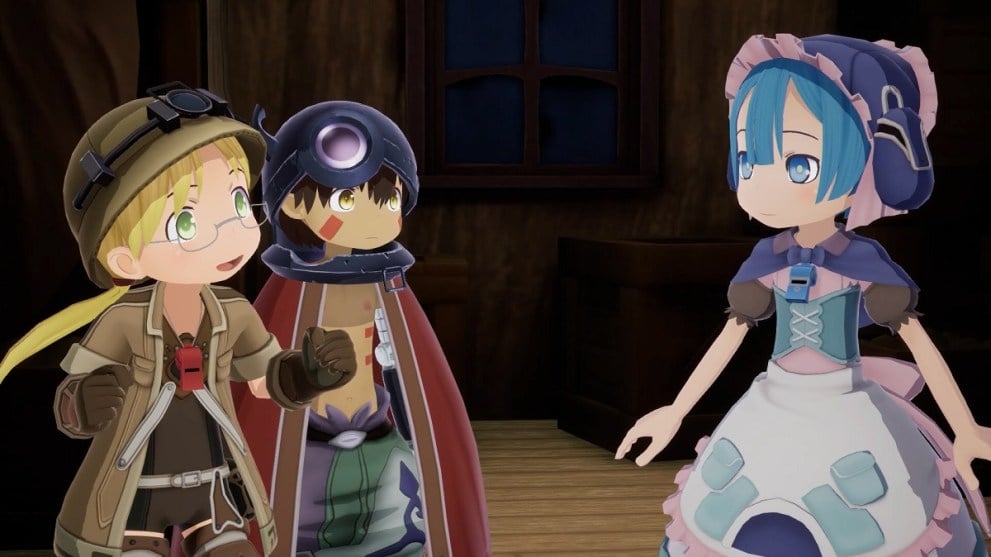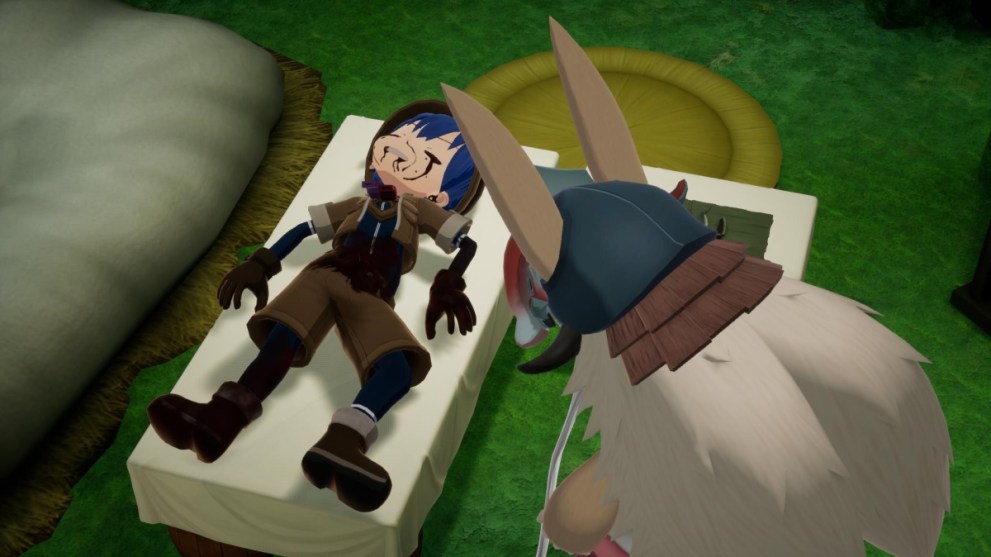Made in Abyss: Binary Star Falling Into Darkness on PS4
Much like the characters within its universe, Made in Abyss: Binary Star Falling Into Darkness suffers from a longstanding curse. It’s tasked with satisfying both longstanding fans of its source material while also offering a solid gameplay experience, neither of which anime games have been known to do well outside of a few key exceptions. Fortunately, this game isn’t as egregious of a failure as other adaptations and even shows potential for something greater to follow it.
One wouldn’t expect this based on how the game starts, though. Kicking off as a direct adaptation of the anime series, the game follows the young cave raider Riko during one of her excursions into the Abyss. While there, she discovers a young boy named Reg, who is both human and robotic, made out of Relics that she and other cave raiders spend their lives in search of.
Shortly after, Riko discovers that her mother – who disappeared during her Last Dive into the Abyss 10 years prior – is alive and even encountered Reg somewhere along her descent into the ancient chasm. This all comes from a tattered note, though, and no one knows where Riko’s mother could be or how she’s survived so long. Desperate for answers, Riko sets out with Reg toward the bottom of the Abyss, braving certain death to find out where her mother is and what she’s been doing.

It’s a decent enough adaptation of the story material, but every other aspect that plays into it drags down the experience. While the graphics and visuals are decent enough, the voice acting is flat, and the musical cues are repetitive, making the short story segment an auditory slog to get through. Other sound design elements are just as bad, with characters repeating the same two or three lines ad-nauseam every time they do anything.
I was ready to mute the game after it played the same musical cues and canned character lines half a dozen times in rapid succession at a blaring pitch, only for characters to pop up on screen and speak so flatly that it was like they were part of a grade school play.
The gameplay doesn’t help much, either. The combat feels repetitive and janky, falling somewhere between that of an early MMO and an older Monster Hunter title. This was worsened by the fact that anything and everything in the game was intent on murdering me the second they spawned in, which was frequently right on top of me with no warning.
Compounding all this were the survival and traversal mechanics, or rather, their unnecessary nature. Similar to the series, the game tasks players with delving further into the Abyss using tools and rock climbing. They likewise need to keep themselves fed using scavenged food items and need to scavenge materials to make new tools if the ones they’re using break.
One likewise needs to be constantly aware of how quickly they ascend upward, as doing so triggers the Curse of the Abyss. Activating said Curse can lead to all manner of negative effects, from an instant hit to one’s hunger meter to an impaired view of the game for a short duration.
All of these are sound gameplay mechanics, but when they were applied to the adaptation segment of Made in Abyss: Binary Star Falling Into Darkness, everything felt like a moot point. Reg could and did make every one of these gameplay elements feel unnecessary. He could defeat enemies before any tools had the chance to be damaged, and could grapple up and down from points around every area several times more quickly than if I’d climbed up to them myself.
Even the Curse of the Abyss felt like an unnecessary element. The segment was focused entirely on going downward whenever possible, making the novel mechanic almost non-existent for a solid stretch of time.
This all served to make the game feel less like a thrilling battle for survival in a dangerous pit and more like a guided tour. To try and stray from this approach felt like a waste of time at best and frustrating at worst.
It was a blessing when the adaptation section of the game concluded after covering only a handful of episodes from the series, not only because it was a pain to play through but because the game truly opens up after this point.

This is because the game is split up into two different sections: The Hello Abyss section, which adapts the anime directly, and the Deep in Abyss section, which tells an entirely new story. The latter is pretty clearly what the game was intended to be from the start and allows every other aspect of the title to shine as bright as it can.
Playing as a young cave raider that the player can create and customize, one must guide them from their origins as a Red Whistle cave raider all the way to being an elite White Whistle, surviving all the dangers the Abyss throws at them along the way. They’ll also need to work their way through a winding story surrounding another young cave raider and the sad tale that led to them becoming obsessed with reaching the bottom of the Abyss.
It’s not a perfect story by any means. Most of the new characters are two-dimensional, and the audio was still abysmal enough to make me want to smash my mute button. All the same, it had enough interesting moments to keep me engaged and felt like a solid first attempt at making something original for the Made in Abyss universe.
The gameplay also saw a marked improvement. Whereas everything felt janky and slow during the Hello Abyss segment, Made in Abyss: Binary Star Falling into Darkness’ Deep in Abyss segment finally explained why. Every element of the gameplay – from the cooking and crafting to the combat, climbing, and survival mechanics – could be made more tolerable via skills earned through RPG-style leveling and skill trees.
There are unlockable combos and moves for weapons, buffs to movement and climbing speed, new item recipes, and plenty of other perks that bring the experience out of the pit that was dug for it.
By the end of my Deep in Abyss playthrough, I was capable of zooming across areas, climbing up to high or low points like a proper adventure game character, and fighting even the most terrifying enemies in a way that was fluid, weighty, and fun. It felt all the better knowing I’d earned this progress too, and it made me feel like I’d truly put in the work to reach this point.
Topping it all off was the fact that the Curse of the Abyss mechanic felt relevant as a constant risk to go along with deeper dives and explorations. It provided regular tension that mounted the lower into the Abyss I got and forced me to think creatively about how I’d climb back out safely.

Sadly, this enjoyment was dragged down by the fact that it could only be experienced after the boring Hello Abyss segment. Deep in Abyss, and everything about the game that’s enjoyable, can’t be played until Hello Abyss is completed, locking the game properly behind what are literally its worst elements.
It’s honestly a crying shame. If it didn’t spend so much time forcing players to play a bland adaptation, this game could have been an exemplar of what anime games can achieve. Instead, it’s just another one of many anime games that will likely be passed over due to its awful first impression.
To be clear, Made in Abyss: Binary Star Falling Into Darkness is not an irredeemable game. It has its high points, and the core experience is one that even non-anime fans could find enjoyable and worthwhile. It’s held back by needing to adapt material from the anime, though, and as a result, the full product is so much less enjoyable than it otherwise could have been.
Pros
Cons
Flat Voice Acting
Repetitive Music
